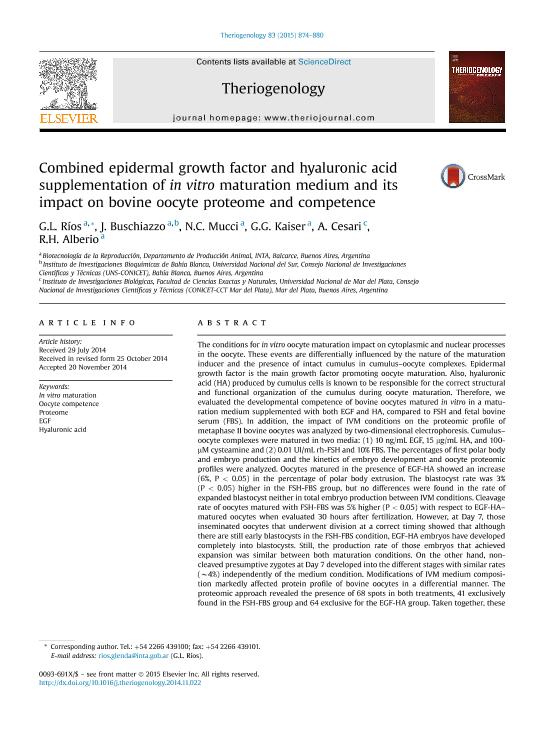Mostrar el registro sencillo del ítem
dc.contributor.author
Rios, Glenda Laura

dc.contributor.author
Buschiazzo, Jorgelina

dc.contributor.author
Mucci, N. C.
dc.contributor.author
Kaiser, Germán Gustavo

dc.contributor.author
Cesari, Andreina

dc.contributor.author
Alberio, R.H.
dc.date.available
2018-05-16T17:04:21Z
dc.date.issued
2015-03
dc.identifier.citation
Rios, Glenda Laura; Buschiazzo, Jorgelina; Mucci, N. C.; Kaiser, Germán Gustavo; Cesari, Andreina; et al.; Combined EGF and Hyaluronic acid supplementation of in vitro maturation medium and its impact on bovine oocyte proteome and competence; Elsevier Science Inc; Theriogenology; 83; 5; 3-2015; 874-880
dc.identifier.issn
0093-691X
dc.identifier.uri
http://hdl.handle.net/11336/45372
dc.description.abstract
The conditions for in vitro oocyte maturation impact on cytoplasmic and nuclear processes in the oocyte. These events are differentially influenced by the nature of the maturation inducer as well as by the presence of intact cumulus in COCs. EGF is the main growth factor promoting oocyte maturation. Also, hyaluronic acid (HA) produced by cumulus cells is known to be responsible for the correct structural and functional organization of the cumulus during oocyte maturation. Therefore, we evaluated the developmental competence of bovine oocytes matured in vitro in a maturation medium supplemented with both EGF and HA, compared to FSH and FBS. In addition, the impact of IVM conditions on the proteomic profile of metaphase II bovine oocytes was analyzed by 2D electrophoresis. Cumulus oocyte complexes were matured in two media: 1) 10 ng/mL EGF, 15 μg/mL HA, 100 μM cysteamine and 2) 0.01 UI/ mL rh-FSH, 10% fetal bovine serum (FBS). The percentages of first polar body and embryo production and the kinetics of embryo development and oocyte proteomic profiles were analyzed. Oocytes matured in the presence of EGF-HA showed an increase (6%, p<0.05) in the percentage of polar body extrusion. The blastocyst rate was 3% (p< 0.05) higher in the FSH-FBS group but no differences were found in the rate of expanded blastocyst neither in total embryo production between IVM conditions. Cleavage rate of oocytes matured with FSH-FBS was 5% higher (p< 0.05) with respect to EGF-HA matured oocytes when evaluated 30h post-fertilization. However, at Day 7, those inseminated oocytes that underwent division at a correct timing showed that while there are still early blastocysts in the FSH-FBS condition, EGF-HA embryos have developed completely into blastocysts. Still, the production rate of those embryos that achieved expansion was similar between both maturation conditions. On the other hand, non-cleaved presumptive zygotes at Day 7 developed into the different stages with similar rates (~4%) independently of the medium condition. Modifications of IVM medium composition markedly affected protein profile of bovine oocytes in a differential manner. The proteomic approach revealed the presence of 68 spots in both treatments, 41 exclusively found in the FSH-FBS group and 64 exclusive for the EGF-HA group. Taken together, these results indicate that combined EGF-HA supplementation of in vitro maturation medium could be used to improve oocyte meiotic competence and ensure a better timing to develop into the blastocyst stage.
dc.format
application/pdf
dc.language.iso
eng
dc.publisher
Elsevier Science Inc

dc.rights
info:eu-repo/semantics/openAccess
dc.rights.uri
https://creativecommons.org/licenses/by-nc-sa/2.5/ar/
dc.subject
Oocyte
dc.subject
Bovine
dc.subject
Maturation
dc.subject
Proteomics
dc.subject.classification
Otras Ciencias Biológicas

dc.subject.classification
Ciencias Biológicas

dc.subject.classification
CIENCIAS NATURALES Y EXACTAS

dc.title
Combined EGF and Hyaluronic acid supplementation of in vitro maturation medium and its impact on bovine oocyte proteome and competence
dc.type
info:eu-repo/semantics/article
dc.type
info:ar-repo/semantics/artículo
dc.type
info:eu-repo/semantics/publishedVersion
dc.date.updated
2018-05-03T16:39:52Z
dc.journal.volume
83
dc.journal.number
5
dc.journal.pagination
874-880
dc.journal.pais
Países Bajos

dc.journal.ciudad
Amsterdam
dc.description.fil
Fil: Rios, Glenda Laura. Instituto Nacional de Tecnología Agropecuaria; Argentina. Consejo Nacional de Investigaciones Científicas y Técnicas; Argentina
dc.description.fil
Fil: Buschiazzo, Jorgelina. Instituto Nacional de Tecnología Agropecuaria; Argentina. Consejo Nacional de Investigaciones Científicas y Técnicas; Argentina
dc.description.fil
Fil: Mucci, N. C.. Instituto Nacional de Tecnología Agropecuaria; Argentina
dc.description.fil
Fil: Kaiser, Germán Gustavo. Instituto Nacional de Tecnología Agropecuaria; Argentina
dc.description.fil
Fil: Cesari, Andreina. Consejo Nacional de Investigaciones Científicas y Técnicas; Argentina
dc.description.fil
Fil: Alberio, R.H.. Instituto Nacional de Tecnología Agropecuaria; Argentina
dc.journal.title
Theriogenology

dc.relation.alternativeid
info:eu-repo/semantics/altIdentifier/url/https://www.sciencedirect.com/science/article/pii/S0093691X14006402
dc.relation.alternativeid
info:eu-repo/semantics/altIdentifier/doi/http://dx.doi.org/10.1016/j.theriogenology.2014.11.022
Archivos asociados
